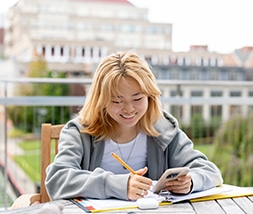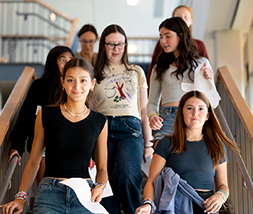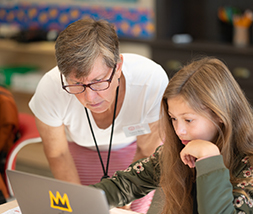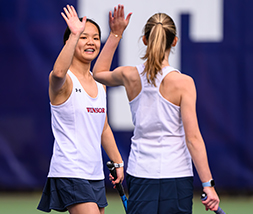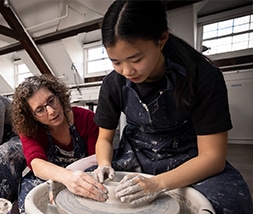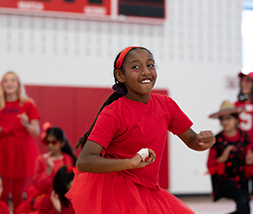Curriculum Guide
World Languages
All Upper School students are required to take three consecutive years of one language. Languages offered are French, Latin, Mandarin Chinese, and Spanish. Students who begin a new language in Class V will complete the requirement at the end of Level 3; those who continue their Lower School language will complete it after the Advanced Topics or AP course. Students will complete the language requirement at the end of Class VII, but students are encouraged to continue their language study in Class VIII. Students may take a second language beginning in Class VI, and should speak with the head of the World Languages Department if they are interested in this option. Students who would like to take a sixth major course in one or both semesters must submit a petition for an additional course (see appendix for petition process). A student with previous experience in a language but who has not taken that language at Winsor must take a placement test. All world languages courses are major courses.
French
Accelerated Foundations in French (1 credit)
This course, an accelerated study of introductory French, is an intensive, fast-paced class that provides the fundamentals of grammar, structure, and vocabulary needed to reach specific, targeted communicative benchmarks. Students learn to recognize patterns in the written and spoken language, and to employ their observations to stretch their own language skills. Activities are designed to help students develop skills in listening comprehension, as well as written and oral proficiency. Readings from various resources give contextualized examples of the topics being studied while also giving the students a glimpse into the diversity and complexity of the French-speaking world. Integrated audio and authentic video materials are regularly used to strengthen students’ aural comprehension and comfort with a range of speakers and accents. The course is designed for students with little or no knowledge of French language or culture.
French 2: Le français, une langue mondiale (1 credit)
In French 2, students continue to develop skills introduced during the Lower School program or in Accelerated Foundations in French. Listening, speaking, writing, and reading skills will be reinforced. Students add to their foundation in grammar and become more adept at communicating and expressing their thoughts in French, both orally and in written form, in full and increasingly complex contexts. Students broaden their vocabulary through the study of several thematic units of the course, ranging from family dynamics to city life, personal health to the arts and media. Students also continue to discover the culture and the richness of the Francophone world through a variety of authentic materials. The class is conducted mostly in French, allowing students to process in English how they learn French. Prerequisite: Accelerated Foundations in French or its equivalent.
French 3: Les Visages de la Francophonie: Les Caraïbes et le Canada (1 credit)
In French 3, students continue to develop their reading, writing, speaking and listening skills. The class includes the study of French grammar in addition to discussion and analysis of Francophone literature, including poetry, short stories, and films. As we examine large cultural movements—such as la Négritude, la mission civilisatrice, Québécois nationalism and la créolité—we will answer questions related to the development of cultural identity. For example, what impact did the creation of the Négritude movement by the Francophone and Caribbean intellectuals, namely Aimé Césaire, Léopold Sédar Senghor, and Léon Gontran Damas, have on perceptions of Black identity and culture? French 3 students will develop their language and analytical skills and will also build a substantial vocabulary as they work to master the grammar needed for a sophisticated level of written and oral communication. This class is conducted entirely in French. Prerequisite: French 2.
French Advanced Topics: La France contemporaine (1 credit)
Stereotypes of France are abundant: baguettes, berets, bicycles, the Eiffel Tower, and moonlight walks on the Seine. Behind these romantic images, the real France is to be found. In this course, we will examine cultural currents, tensions and developments in contemporary France. These will include the exploration of topics including immigration, political engagement, religious identity, environmental stewardship, and music and cultural expression. We will delve into these topics while considering how they are represented in the French and world media, as well as how they relate to similar trends we face in America. In this course, taught entirely in French, students will expand their vocabulary base and their command of sophisticated grammatical structures and will develop their linguistic skills as they learn to discuss, debate, and present their points of view on these current topics. Students can take this course after completing French 3. Prerequisite: French 3.
French AP: French Language and Culture (1 credit)
The French Language and Culture course takes a holistic approach to language proficiency. The course “emphasizes communication (understanding and being understood by others) by applying interpersonal, interpretive, and presentational skills in real-life situations. This includes vocabulary usage, language control, communication strategies, and cultural awareness,” as articulated by the College Board AP French Language and Culture Course Overview. The AP course strives to engage students in an exploration of culture in both contemporary and historical contexts. Authentic materials from the French and Francophone world provide the basis for vocabulary acquisition and class discussion. Students also solidify previously learned grammatical structures and expressions as well as discover additional nuances of the language. The three modes of communication—interpersonal, interpretive, presentational—in which students will demonstrate proficiency, are foundational to the AP French Language and Culture course. The six course themes that students will explore are built on the three modes of communication as articulated by the College Board. In order to best facilitate the study of language and culture, the AP course is conducted entirely in French. This course prepares students to take the AP French Language and Culture Exam. Students can take this course after completing French 3 or French Advanced Topics. Prerequisite: French 3.
French Fall Senior Seminar: Le Deuxième Sexe, L’expérience et la représentation des femmes françaises et francophones dans la littérature et les films (0.5 credits, fall)
In the French Fall Senior Seminar, students will explore representations of French and Francophone women, both how these women view themselves and how they are viewed by others. Students will come to understand the challenges, obstacles, and socio-political circumstances that have shaped the lives of these sensitive, yet determined women who have worked to establish identity and prevail as intellectual beings over time and across geo-political space. Texts and films by French and Francophone authors and filmmakers create a rich and varied portrait of the lives of “le deuxième sexe.” Through a final project, students will gain insight into their own experiences as young women coming of age in the 21st century. This class is conducted entirely in French. Students can take this course after completing French Advanced Topics or French AP. Prerequisite: French Advanced Topics or French AP.
French Spring Senior Seminar: Camus et l’absurde (0.5 credits, spring)
This course will be a seminar-style class that will take as its main focus the Absurdist movement, a literary movement, part of a larger existential philosophical trend, which was a central part of French intellectual life in the mid-20th century. In order to approach the concept of the absurd, in literature and perhaps in our own lives as well, we will read and analyze texts and philosophical writings of this time period by Albert Camus, a writer, journalist and philosopher. We will read and examine several of his works, including the “Le Mythe de Sisyphe,” “Lettres à un Ami Allemand,” and “La Peste.” Sophisticated analyses coupled with playful interpretations will comprise student learning in this course: careful reading, both analytical and personal writing, active discussion and creative interpretations will constitute the bulk of student work. As a culmination of their French study at Winsor, students will employ the analytical, artistic and linguistic skills they have developed during their time here. This class is conducted entirely in French. Students can take this course after completing French Advanced Topics or French AP. Enrollment in French Fall Senior Seminar is not required to take the Spring Senior Seminar. Prerequisite: French Advanced Topics or French AP.
Latin
Accelerated Foundations in Latin (1 credit)
This course, an accelerated study of introductory Latin, is an intensive, fast-paced class that provides the fundamentals of grammar, structures, and practical vocabulary in order to be able to read texts in Latin, along with an ability to engage in regular oral and written communication. New topics of study are introduced through daily readings about Greco-Roman culture, history, and mythology. A regular emphasis on vocabulary building provides students with the skills to recognize, use, and decipher word roots, suffixes and prefixes, not only in Latin, but also in English and other modern languages. The course is designed for students with little or no knowledge of Latin.
Latin 2 (1 credit)
Latin 2 students begin the year examining the Latin text of several important Roman myths, working to become more fluent readers of Latin prose. They expand upon their understanding of Latin grammar and vocabulary through regular practice, grammar exercises, and Latin composition projects, all while gaining a fundamental understanding of the values of ancient Roman society as expressed in mythology. In the second semester, the students tackle stories with increasingly complex Latin syntax as they transition to reading stories of the legendary founding of Rome and accounts of the history of the Roman Republic adapted from Livy’s Ab Urbe Condita. These readings help students to build a context for their further study of important literary works of the late Roman Republic and early Roman Empire, which will be covered in subsequent courses. Prerequisite: Accelerated Foundations in Latin or its equivalent.
Latin 3 (1 credit)
During the first semester, students complete their study of Latin grammar and explore the portrayals of women and non-Romans in Latin literature. They read selections, adapted and unadapted, from classical authors such as Livy, Valerius Maximus Ovid, Horace, as well as modern novellas of famous women in the ancient Mediterranean. In addition to analyzing the readings’ grammar and syntax, students discuss how these stories reflect the cultural values and biases of the authors, thus gaining experience with literature analysis. In the second semester, students read selections from Vergil’s Aeneid. These readings offer insight into the empire-building culture of the late Roman Republic and one of its most notable historical figures. Students will come to understand the Roman definition of virtus and pietas and also examine how Rome viewed their relationships to foreign nations. Prerequisite: Latin 2.
Latin AP (1 credit)
Following the curriculum of the revised College Board’s Advanced Placement course in Latin, students read selections from Books I, II, IV, and VI, VII, XI, and XII of the Aeneid in Latin and selections from Pliny’s Letters. In addition to these authors, students will read other works of Latin prose and poetry. The College Board requires a set of “project readings” each year, and, in addition to the required readings, classes will choose selections from a list of suggested readings. The reading and analysis of the Latin texts lead to discussions of the works’ literary significance and historical background. There is an emphasis on connecting the modern and ancient worlds to better understand the causes and effects of political struggle, the interplay between different cultures, and the moral and ethical questions with which humans struggle. The students also explore the mythical and legendary aspects of Roman culture, thus acquiring knowledge that will aid their reading of any literature that has classical foundations. This course prepares students to take the AP Latin Exam. Prerequisite: Latin 3.
Latin Fall Senior Seminar: Cicero: A Study in Style (0.5 credits, fall)
A novus homo from a small town outside of Rome, Cicero rose to prominence in politics at a time when the foundations of the Roman Republic were being shaken at their core. Though he ascended the cursus honorum to the consulship, it was his writings that shaped his legacy. Cicero’s influence on Latin prose was so immense that nearly all writers who came after were characterized as either a reaction against or return to his style. Nor was his impact limited to the Roman world; from the Enlightenment to President Obama, from the founding fathers to A Few Good Men, Cicero’s influence appears across a wide swath of modern culture. Over the course of the semester, students will read selections from both his political and legal orations to analyze both his thinking and his style. Additionally, students will examine speeches from—both historical and literary—and trace the influence of Cicero’s thinking and style in modern politics, literature, and film. Students can take this course after taking Latin 3 or Latin AP. Prerequisite: Latin 3.
Latin Spring Senior Seminar: Lyric Poetry (0.5 credits, spring)
Students read the lyric poems of such authors as Catullus, Horace, Propertius, and Ovid, whose topics center on themes of daily life, loves, and friendships from the perspectives of the most notable poets of the late Roman Republic and early Roman Empire. In addition, students examine the socio-political climate of the times in order to better understand the context of the writings. Students make connections between Roman poets and their Greek predecessors, including Sappho and Callimachus. Students may also read later Latin poems that are influenced by these Golden Age authors, in addition to exploring modern interpretations and adaptations of these works. The skills of reading, translation, analysis, and essay writing are emphasized. Students can take this course after taking Latin 3 or Latin AP. Enrollment in Latin Fall Senior Seminar is not required to take the Spring Senior Seminar. Prerequisite: Latin 3.
Mandarin Chinese
Accelerated Foundations in Mandarin Chinese (1 credit)
This course, an accelerated study of introductory Mandarin Chinese, is an intensive, fast-paced course that introduces students to spoken Mandarin and written Simplified Chinese, with an emphasis on pronunciation, the romanization system (Pinyin and tones), and the building blocks (radicals) of Chinese characters (Hanzi). Students will build their vocabulary, learn to write and type characters, and develop skills for everyday conversations. Students are encouraged to speak Chinese in class, to utilize their resources, and to establish their study strategies for learning the language. This course also explores cultural topics from both ancient and contemporary China through short videos, cultural projects, and current events. By combining collaborative group activities and independent learning, the class accommodates different learning styles. The course is designed for beginners as well as for students with some prior knowledge of the Chinese language and culture.
Mandarin Chinese 2: Traveling to China (1 credit)
This course builds upon foundational knowledge of spoken and written Chinese as students develop the productive, receptive, and cultural skills necessary for effective communication with native speakers. As new grammatical structures are introduced, basic grammar will be reviewed and reinforced. Students will learn to use a wide range of vocabulary to discuss a variety of everyday topics, ranging from weather and directions, to birthday celebrations, sports, and travel events. Through readings, writing exercises, and role-playing activities, students will enhance their linguistic abilities and creative expression. This course provides opportunities to practice and master independent learning skills, as well as to enhance communication skills and to explore Chinese culture through group activities. Prerequisite: Accelerated Foundations in Mandarin Chinese or its equivalent.
Mandarin Chinese 3: Living in China (1 credit)
This course builds on skills developed in previous years, preparing students to navigate real-life situations in Mandarin. Emphasis is placed on improving pronunciation and oral proficiency, while continuing to develop reading and writing skills. Students will engage in spontaneous conversations on topics such as school life, urban living, renting an apartment, applying for a job, and education. Research projects and presentations enhance students’ grasp of Chinese grammar, expand their vocabulary, and deepen their understanding of contemporary Chinese society. This course also provides opportunities to practice independent learning and communication skills, with an emphasis on exploring Chinese culture through group activities. Prerequisite: Mandarin Chinese 2.
Mandarin Advanced Topics: China: Past, Present and Future (1 credit)
This course offers students the opportunity to explore China’s rich cultural traditions, to compare contemporary China with its pre-reform era, and to examine evolving perspectives within modern Chinese society. Topics covered will range from feudal society to the present day. Students will engage in descriptive, interpretive, and reflective writing and will deliver oral presentations based on the materials studied in class, including news articles, video clips, and podcasts. Through individual and group projects, students will demonstrate their proficiency in both simple and complex grammatical structures, using their linguistic skills to draw comparisons between Chinese culture and their own. This course is primarily conducted in Mandarin. Prerequisite: Mandarin Chinese 3.
Mandarin Chinese AP (1 credit)
This course is designed to help students improve their proficiency in listening, speaking, reading, and writing in preparation for the AP Chinese Language and Culture exam. Students will engage with the Chinese language and culture through a variety of materials and will have extensive exposure to cultural elements integrated into the learning process. Three modes of communication—interpersonal, interpretive, and presentational—are central to this course. Students will explore topics reflecting various aspects of Chinese society and culture through six course themes—families and communities, personal and public identities, beauty and aesthetics, science and technology, contemporary life, and global challenges—as they master communication conventions and develop fluency. Each unit includes vocabulary acquisition and application, sentence pattern practice, language skills, text analysis, supplementary reading, and finally, writing assignments and tests. In order to best facilitate the study of language and culture, the AP course is conducted entirely in Mandarin. This course prepares students to take the AP Chinese Language and Culture Exam. Prerequisite: Mandarin Advanced Topics, or Mandarin 3 and department permission.
Mandarin Senior Seminar: Social Perspectives (0.5 credits per semester, fall and/or spring)
This advanced-level course aims to enhance students’ language proficiency through the exploration of social issues in contemporary China. Students will engage with a variety of topics that provide real-world context for their language development, including the urban-rural divide, Chinese aesthetics, migrant workers, feminism, and human rights movements. This course is designed to strengthen debating, writing, and speaking skills through group discussions, essays, presentations, and critical reflections. A variety of language exercises will support the improvement of students’ conceptual understanding and oral expression. This is a two-semester course, and seniors have the option to enroll in fall semester only, spring semester only, or both semesters. Prerequisites: Mandarin Advanced Topics or Mandarin AP.
Spanish
Accelerated Foundations in Spanish (1 credit)
This course, an accelerated study of introductory Spanish, is an intensive, fast-paced course that provides the fundamentals of grammar, structure, and practical vocabulary needed to reach specific, targeted communicative benchmarks. Students learn to recognize patterns in the written and spoken language, and employ their observations to stretch their own language skills. Classroom activities are designed to develop skills in listening comprehension, as well as written and oral proficiency. Readings from various texts give contextualized examples of the grammar being studied while also giving the students a glimpse into the diversity and complexity of the Spanish-speaking world. Students regularly use integrated audio and video materials to strengthen aural comprehension and comfort with a range of speakers and accents. Throughout the year, students are engaged in research and creative projects relevant to the thematic units they study. This course is designed for beginners or students with limited knowledge of Spanish.
Spanish 2: Voces del mundo hispano (Voices from the Spanish-speaking world) (1 credit)
In Spanish 2, students continue to develop skills introduced during the Lower School program or Accelerated Foundations in Spanish. Listening, speaking, writing, and reading skills are reinforced on a daily basis. Students add to their foundation in grammar and become more adept at communicating and expressing their thoughts in Spanish, both orally and in written form, in full and increasingly complex contexts. Students broaden their vocabulary and grammar concepts through projects and activities designed to practice and deepen their understanding of language and culture through everyday interactions with authentic thematic materials. They also continue to discover the richness of the cultures in the Spanish-speaking world. The class is conducted mostly in Spanish, allowing students to process in English how they learn Spanish. Prerequisite: Accelerated Foundations in Spanish or its equivalent.
Spanish 3: Discovery, Encounter, Conquest: Multiple Perspectives (1 credit)
In Spanish 3, students continue to develop their reading, writing, speaking and listening skills. The class includes an in-depth study of complex grammar structures as a foundation for oral and written proficiency. In addition to discussion and analysis of the cultural material, students are expected to think deeply about their own relationship to the central theme of the course: the cultural encounters. Starting with the study of the encounter between Europe and the Americas, students learn a wide range of vocabulary to express themselves with subtlety and nuance. They explore the poetry of Sor Juana Inés de la Cruz, Nicolás Guillén, and Pablo Neruda, as well as the work of contemporary writers such as Reinaldo Arenas, Eduardo Galeano, and Norberto James. The year finishes with a careful examination of the contemporary repercussions of various historical events, including liberation theology in the context of studying the civil wars in Central America. Students learn to interpret, question, discuss, and respond to these texts using academic Spanish. Short stories from Ciudad Real by Rosario Castellanos are read at the end of the year. This class is conducted mostly in Spanish, allowing students to process in English how they learn Spanish. Prerequisite: Spanish 2.
Spanish Advanced Topics: Recursos y Relaciones (1 credit)
On a shrinking planet, how will human communities make decisions about the distribution, use, and conservation of precious natural resources, such as food, water and fuel? How do the universal needs for these resources and the impact of their use, misuse, and exploitation affect relations between communities and nations? How have artists, poets, writers, journalists, philosophers, politicians, activists, scientists, and educators reacted and denounced the impact of the use, abuse, and exploitation of resources? What role have ethics played in this context? What contributions have these communities made to global understanding of these themes? How do our options and choices impact the outcome of the transactions? This course allows students to explore the themes of resources and international relations, pursuing their personal interests and questions while engaging with primary resources in advanced Spanish. Listening, speaking, reading, writing, and cultural competency are developed. Class is conducted entirely in Spanish. Students can take this course after completing Spanish 3. Prerequisite: Spanish 3.
Spanish AP: The Hispanic Caribbean Past and Present (1 credit)
This course focuses on the Hispanic Caribbean past and present, while incorporating interdisciplinary topics and current events that explicitly address six course themes: Global Challenges, Science and Technology, Contemporary Life, Personal and Public Identities, Families and Communities, and Beauty and Aesthetics. Students explore the history and cultures of Cuba, the Dominican Republic, and Puerto Rico through literary texts, historical documents, the media, documentaries, films, music, movement, testimony, and guest speakers. The three modes of communication (interpersonal, interpretive and presentational), in which students will demonstrate proficiency, are foundational to the Spanish AP course. From the colonial experience through independence, from institutionalized slavery to abolition, and from Europe’s influence to that of the United States’, students explore the past and present of the cultures in which the language is spoken. Students read authors such as Simón Bolívar, José Martí, José Antonio Saco, Eugenio María de Hostos, Salomé Ureña, Nicolás Guillén, Julia de Burgos, Esmeralda Santiago, Elizabeth Santiago, and Carmen Rivera. The six learning objectives/thematic approaches that students will explore are built on the three modes of communication as articulated by the College Board AP Spanish Language and Culture Course Overview. In order to best facilitate the study of language and culture, the AP course is conducted entirely in Spanish. This course prepares students to take the AP Spanish Language and Culture Exam. Students can take this course after completing Spanish 3 or Spanish Advanced Topics. Prerequisite: Spanish 3.
Spanish Fall Senior Seminar: La Justicia (0.5 credits, fall)
What is justice? What does it mean to you personally to be just? How do your personal beliefs and values inform your understanding of justice? What is your role in the struggle for justice in your community and in the world? What can we learn from artists, poets, writers, journalists, philosophers, politicians, activists, scientists, and educators about this theme in the Spanish-speaking world and in the Spanish-speaking communities here in the United States? This course allows students to explore the theme of justice, pursuing their personal interests and questions while engaging with primary resources in advanced Spanish. Students can take this course after completing Spanish Advanced Topics or Spanish AP. Prerequisite: Spanish Advanced Topics or Spanish AP.
Spanish Spring Senior Seminar: Towards a More Sustainable and Democratic Future of Innovation, Technology, Science, and Design (0.5 credits, spring)
During the spring semester, students explore social justice by focusing on the challenges posed by climate change. Students will learn about how scientific and technological innovation models in Spanish-speaking countries are being used to respond to this global crisis. As students identify their personal connections to this global crisis, they will focus on this question: How can the initiatives of the 2030 UN agenda help us build healthy societies and dignified, habitable spaces while allowing us to reconnect with nature, and achieve more peaceful and sustainable life models? Guided by this question, students will analyze videos, texts and relevant information about sustainable development in order to identify the most urgent changes to advance the 2030 Agenda for Development. In addition, local Latino experts in the fields of design, science, art, technology, and innovation will be invited to share their work in order to help students deepen the exploration of themes of sustainability. Using the design thinking model, students will create a final project to showcase the work they have done throughout the semester. The seminar concludes with a summit at which students will present their creative conclusions and proposals to other Spanish classes. Students can take this course after completing Spanish Advanced Topics or Spanish AP. Enrollment in Spanish Fall Senior Seminar is not required to take the Spring Senior Seminar. Prerequisite: Spanish Advanced Topics or Spanish AP.
